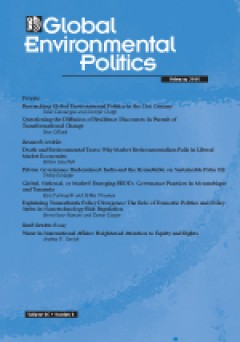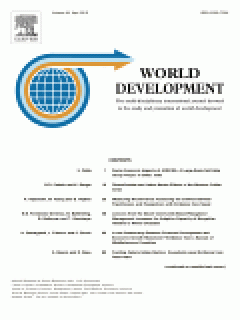Filter by

Exclusionary employment in Britain’s broken labour market
There is growing evidence of the problematic nature of the UK’s ‘flexible labour market’ with rising levels of in-work poverty and insecurity. Yet successive governments have stressed that paid work is the route to inclusion, focussing attention on the divide between employed and unemployed. Past efforts to measure social exclusion have tended to make the same distinction. The aim of this artic…
- Edition
- Volume 36, Number 1, February 2016 p. 82-103
- ISBN/ISSN
- 02610183
- Collation
- -
- Series Title
- Critical Social Policy
- Call Number
- -

Child poverty in the UK: Measures, prevalence and intra-household sharing
There is cross-party agreement on the urgency of addressing child poverty in the UK, but less consensus on how to define and measure it, and understand its causes and effects. The Conservative/Liberal Coalition government’s policy and rhetoric favoured individual explanations for poverty, portraying poor parents as making bad spending decisions, and transmitting their attitudes and behaviours o…
- Edition
- Volume 36, Number 1, February 2016 p. 38-61
- ISBN/ISSN
- 02610183
- Collation
- -
- Series Title
- Critical Social Policy
- Call Number
- -

Navigating the stigmatised identities of poverty in austere times: Resisting …
Behavioural explanations of poverty and disadvantage have figured heavily in political rhetoric in the era of austerity, as a means to understand trajectories into poverty and subsequent relationships between benefit claimants and the state. These discourses are not restricted to political debate, as previous studies demonstrate they impact upon public consciousness and structure the ways that …
- Edition
- Volume 36, Number 1, February 2016 p. 21-37
- ISBN/ISSN
- 02610183
- Collation
- -
- Series Title
- Critical Social Policy
- Call Number
- -

Policies and discourses of poverty during a time of recession and austerity
This article introduces this themed issue which challenges government policies and discourses using evidence from the UK 2012 Poverty and Social Exclusion Study. Policies and discourses prioritising the role of individual deficiencies and highlighting the structural problems of the welfare state in poverty causation are nothing new. However, they re-emerged vigorously in the UK following the 20…
- Edition
- Volume 36, Number 1, February 2016 p. 3-20
- ISBN/ISSN
- 02610183
- Collation
- -
- Series Title
- Critical Social Policy
- Call Number
- -

Social Inequalities, Empowerment, and Women’s Transitions into Abusive Marr…
Extant sociological theories of gendered power within marriage focus on how social forces—such as gender inequality—shape women’s power within already established partnerships and subsequently affect their risk of intimate partner violence. Yet, inequitable social forces similarly shape women’s life conditions prior to and during the marital transition, with implications for women’s power in ma…
- Edition
- Volume 30, Number 4, August 2016 p. 670-694
- ISBN/ISSN
- 08912432
- Collation
- -
- Series Title
- Gender & Society
- Call Number
- -

The Gender Pray Gap: Wage Labor and the Religiosity of High-Earning Women and…
Social scientists agree that women are generally more religious than men, but disagree about whether the differences are universal or contingent on social context. This study uses General Social Survey data to explore differences in religiosity between, as well as among, women and men by level of individual earned income. Extending previous research, I focus on high earners with other groups in…
- Edition
- Volume 30, Number 4, August 2016 p. 643-669
- ISBN/ISSN
- 08912432
- Collation
- -
- Series Title
- Gender & Society
- Call Number
- -

Men Wanted: Heterosexual Aesthetic Labor in the Masculinization of the Hair S…
This article builds heterosexuality into the concept of aesthetic labor to better understand corporate efforts to construct gendered brands and consumer identities. By theorizing heterosexual aesthetic labor, I show how two men’s salons, Adonis and The Executive, hire for, develop, and mobilize the sexual identities and gender habitus of straight and conventionally feminine women to masculinize…
- Edition
- Volume 30, Number 4, August 2016 p. 618-642
- ISBN/ISSN
- 08912432
- Collation
- -
- Series Title
- Gender & Society
- Call Number
- -

Masculinity and the Stalled Revolution: How Gender Ideologies and Norms Shape…
Extant research suggests that supportive work–family policies promote gender equality in the workplace and in the household. Yet, evidence indicates that these policies generally have stronger effects on women’s preferences and behaviors than men’s. In this article, we draw on survey-experimental data to examine how young, unmarried men’s gender ideologies and perceptions of normative masculini…
- Edition
- Volume 30, Number 4, August 2016 p. 590-617
- ISBN/ISSN
- 08912432
- Collation
- -
- Series Title
- Gender & Society
- Call Number
- -

Gender-Based Violence Against Men and Boys in Darfur: The Gender-Genocide Nexus
Analyses of gender-based violence during mass conflict have typically focused on violence committed against women. Violence perpetrated against men has only recently been examined as gender-based violence in its own right. Using narratives from 1,136 Darfuri refugees, we analyze patterns of gender-based violence perpetrated against men and boys during the genocide in Darfur. We examine how this…
- Edition
- Volume 30, Number 4, August 2016 p. 565-589
- ISBN/ISSN
- 08912432
- Collation
- -
- Series Title
- Gender & Society
- Call Number
- -

Explaining Transatlantic Policy Divergence: The Role of Domestic Politics and…
In this study, we seek to explain a growing divergence between the US and EU regulatory policies over nanotechnology environmental, health, and safety risks. Faced with significant scientific and regulatory uncertainties, incremental approaches have been taken in both regulatory systems, but substantial differences are evident in terms of both policy processes and stringency. While the EU exhib…
- Edition
- Volume 16, Number 1, February 2016, p. 79–98.
- ISBN/ISSN
- 1526-3800
- Collation
- -
- Series Title
- Global Environmental Politics
- Call Number
- -

Global, National, or Market? Emerging REDD+ Governance Practices in Mozambiqu…
This article examines emerging governance practices in the REDD (Reducing Emissions from Deforestation and Forest Degradation) initiative. We examine three different general governance practices (neoliberal, post-national, and government-led practices) that have been applied in the interaction between international organizations and two REDD target countries: Mozambique and Tanzania. In these c…
- Edition
- Volume 16, Number 1, February 2016, p. 59–78.
- ISBN/ISSN
- 1526-3800
- Collation
- -
- Series Title
- Global Environmental Politics
- Call Number
- -

Private Governance Undermined: India and the Roundtable on Sustainable Palm Oil
Are emerging markets undermining private environmental governance? In the past, most trade in agricultural commodities occurred between developed and developing countries, but in recent years the volume of South-South trade has increased significantly. The booming demand from emerging markets for food, feed, and fiber is now a key driver behind agricultural expansion, causing large-scale defore…
- Edition
- Volume 16, Number 1, February 2016, p. 38–58.
- ISBN/ISSN
- 1526-3800
- Collation
- -
- Series Title
- Global Environmental Politics
- Call Number
- -

Questioning the Diffusion of Resilience Discourses in Pursuit of Transformati…
Desirable responses to global environmental challenges are increasingly being characterized as requiring transformational social change. Keeping pace with this growing imperative, discourses of resilience are shifting away from an emphasis on durability toward more progressive themes. After briefly revisiting the interdisciplinary origin of social-ecological resilience, some lingering concerns …
- Edition
- Volume 16, Number 1, February 2016, p. 13–20.
- ISBN/ISSN
- 1526-3800
- Collation
- -
- Series Title
- Global Environmental Politics
- Call Number
- -

Death and Environmental Taxes: Why Market Environmentalism Fails in Liberal M…
This article aims to explain why market-based climate policies (carbon levies and emissions trading) have had limited success at the national level in “liberal-market economies” like Australia, Canada, and the United States. This situation is paradoxical to the extent that market environmentalism is often thought to be a concept tailored to the political traditions and policy paradigms in these…
- Edition
- Volume 16, Number 1, February 2016, p. 21–37.
- ISBN/ISSN
- 1526-3800
- Collation
- -
- Series Title
- Global Environmental Politics
- Call Number
- -

Researching Global Environmental Politics in the 21st Century
This forum article highlights three major research trends we have observed in the journal Global Environmental Politics since 2000. First, research has increasingly focused on specific and formal mechanisms of global environmental governance, contributing to more elaborate and refined methodologies that span more scales and levels of analysis. Second, research increasingly has concentrated on t…
- Edition
- Volume 16, Number 1, February 2016 p. 1–12
- ISBN/ISSN
- 1526-3800
- Collation
- -
- Series Title
- Global Environmental Politics
- Call Number
- -

World Development, Volume 84, August 2016
- Edition
- -
- ISBN/ISSN
- 0305750X
- Collation
- -
- Series Title
- -
- Call Number
- -
- Edition
- -
- ISBN/ISSN
- 0305750X
- Collation
- -
- Series Title
- -
- Call Number
- -

World Development, Volume 85, September 2016
- Edition
- -
- ISBN/ISSN
- 0305750X
- Collation
- -
- Series Title
- -
- Call Number
- -
- Edition
- -
- ISBN/ISSN
- 0305750X
- Collation
- -
- Series Title
- -
- Call Number
- -

World Development, Volume 78, February 2016
- Edition
- -
- ISBN/ISSN
- 0305750X
- Collation
- -
- Series Title
- -
- Call Number
- -
- Edition
- -
- ISBN/ISSN
- 0305750X
- Collation
- -
- Series Title
- -
- Call Number
- -

World Development, Volume 79. March 2016
- Edition
- -
- ISBN/ISSN
- 0305750X
- Collation
- -
- Series Title
- -
- Call Number
- -
- Edition
- -
- ISBN/ISSN
- 0305750X
- Collation
- -
- Series Title
- -
- Call Number
- -

World Development, Volume 80, April 2016
- Edition
- -
- ISBN/ISSN
- 0305750X
- Collation
- -
- Series Title
- -
- Call Number
- -
- Edition
- -
- ISBN/ISSN
- 0305750X
- Collation
- -
- Series Title
- -
- Call Number
- -
 Computer Science, Information & General Works
Computer Science, Information & General Works  Philosophy & Psychology
Philosophy & Psychology  Religion
Religion  Social Sciences
Social Sciences  Language
Language  Pure Science
Pure Science  Applied Sciences
Applied Sciences  Art & Recreation
Art & Recreation  Literature
Literature  History & Geography
History & Geography